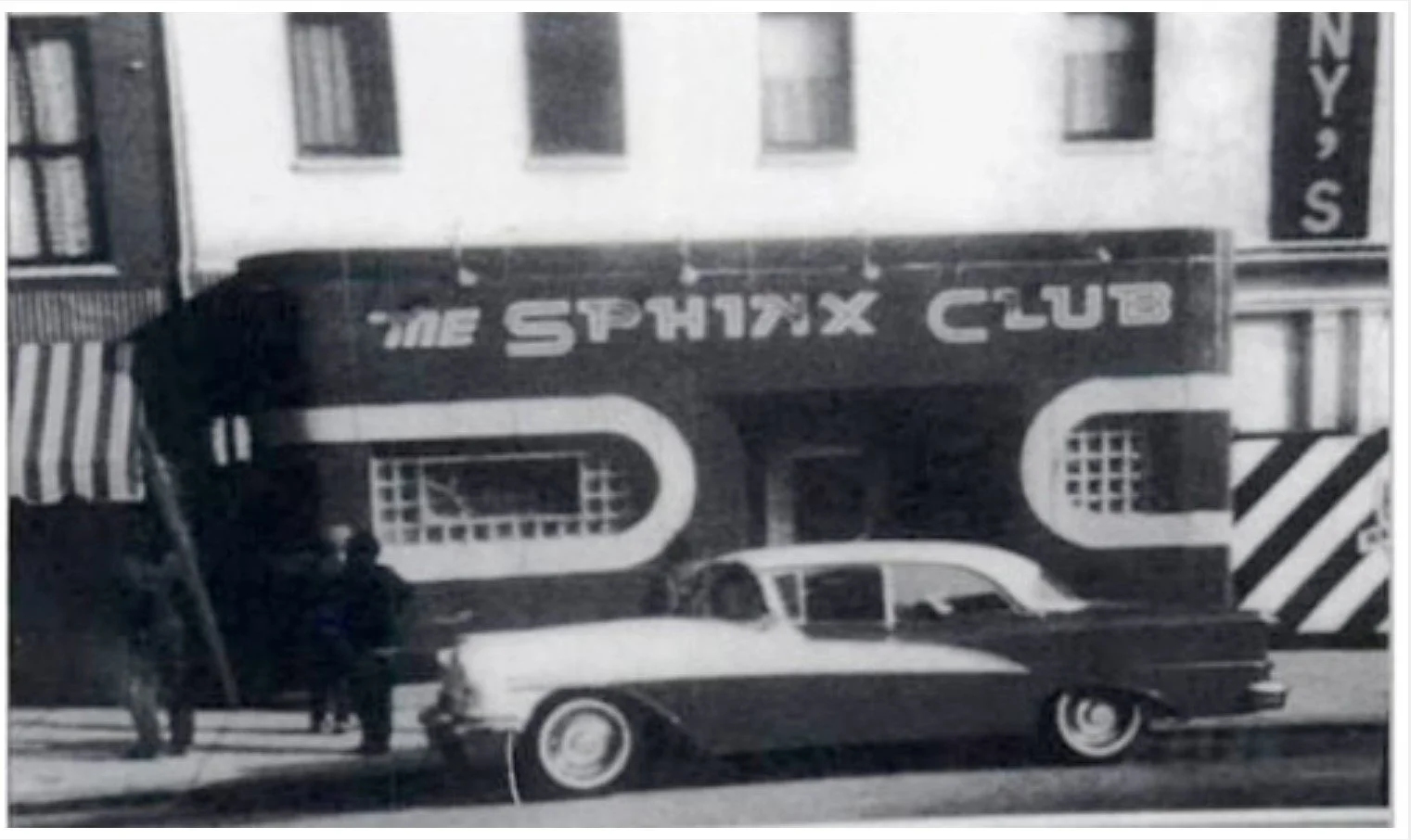About Us
Source: The Baltimore Times, Eli Pousson of the Baltimore Sun - To ride past 2107-2109 Pennsylvania Avenue in Baltimore, Maryland, passer-byers might look at the structure and consider it as just another boarded-up city building. But for those who know the building’s history, the structure is one of the jewels of Pennsylvania Avenue’s heyday. A place where many successful Blacks gathered, and where the likes of Sam Cooke, Redd Foxx, Sarah Vaughn, and other famous entertainers came through its doors. It is the site of The Sphinx Club, opened in 1946 by Charles Tilghman, and one of the nation’s first African American-owned nightclubs.
The Sphinx, a private club known for its after-show parties and famous New Year’s Eve and Mardi Gras affairs where jazz greats congregated with local celebrities, closed in 1992. “The Sphinx Club was really a great place to go,” said Shirley Gordon, who patronized the Sphinx Club. “Anybody who was somebody went to The Sphinx Club. Victorine Adams had a dress shop on Pennsylvania Avenue, and women went there to purchase their fabulous clothes to wear to The Sphinx Club.”
Rosa “Rambling Rose” Pryor-Trusty who is a well-known entertainment columnist, is the author of “African-American Entertainment in Baltimore” and talks about the Sphinx Club in her book. “People from all walks of life came in that club,” recalled Pryor-Trusty. “I met many famous judges, lawyers, doctors, and politicians right there in The Sphinx.” She added, “Charlie was such a gentleman to so many people. He was a good man and a giving man. He was also very clever and very witty. He was quite the businessman and a true legend.”
In December 2021, Norman P. Fleming re-launched The Sphinx Club® concept, experience, and upscale standard to Chicago and Atlanta. Chicago is one of the top destinations for college-educated professionals with advanced degrees. Our strategy is to support Black-owned and Diversity-friendly venues, entertainers, services, and businesses by offering The Sphinx Club® experience to world-class cities.
The Sphinx Club® is currently composed of minority professionals with advanced degrees. We are Executives and Small Minority Business Owners (MBE) focused on providing world-class events to mature professionals. Our events fill the glaring void in Chicago, Dallas, Philadelphia, Houston, Detroit, Baltimore, and Atlanta by offering upscale social events for local professional organizations, such as NBMBAA, NABJ, NABA, NSBE, BDPA, National Urban League, 100 Black Men of America, Divine-9 Greek-Lettered Alumni Chapters, HBCU Alumni Chapters, NSN Sales Network, Congressional Black Caucus, etc.
The Sphinx Club® Membership has its Privileges.
“Celebrating the Legacy of Mr. Charles P. Tilghman and the Original Founder of The Sphinx Club”
Recent News Article: By CHRISTINA TKACIK, Baltimore Sun, January 13, 2022.
The Sphinx Club was the place to be for Black Baltimore. Its founder’s grandson wants to bring it back.
Today, the building in the 2100 block of Pennsylvania Avenue has boards covering door and window frames. But it was once the Sphinx, the members-only nightclub that for decades was the place to see and be seen for Black Baltimore.
“It was a really classy place to be,” said Charles R. Tilghman, who spent many days of his youth in the club founded by his grandfather, Charles P. Tilghman, who opened it in 1946. Men removed their hats while women wore diamonds and furs. “That day and era is just about gone,” recalled Tilghman.
Tilghman wants to make sure the city remembers it. He carries with him a photo album documenting the club’s history, and a key card that members used to open the door. Last fall, he held an event to honor his grandfather’s legacy — Mayor Brandon Scott, whose grandparents were regulars, attended.
In an era of strict segregation, Black Baltimore could enjoy “The Avenue,” as residents called the Pennsylvania Avenue corridor, with its lounges, theaters and clubs. No place shone brighter than The Sphinx, the preferred spot for politicians, judges, lawyers and other Black professionals.
Here, politicians made toasts, Sam Cooke sang and comedian Redd Foxx got belly laughs. Musicians enjoyed playing at the Sphinx because of its personal atmosphere, said Rosa Pryor-Trusty, a former music promoter who booked shows at the club.
“It was like a private home away from home. Everybody knew each other,” she said — and if they didn’t, they soon became friends. In its heyday, the club made more than $1 million a year. But its founder, who died in 1988, had grown up “dirt poor” in East Baltimore, recalled his grandson.
“He didn’t have a formal education like high school or a college degree,” Tilghman said, but he was “an economic genius.” His training happened on the job. “He worked at a famous bar in East Baltimore — the Club Ambassador. It was a hot club back in the day,” Tilghman said. The Ambassador’s proprietor mentored the young Tilghman, teaching him the ins and outs of the nightclub business. He even helped him buy a building of his own on Pennsylvania Avenue, where Tilghman opened the Club Manhattan in 1941.
Tilghman shut down the Club Manhattan after being stabbed during an attempted robbery. He decided to reopen it as a members-only nightclub, according to his grandson. The plan worked.
“Everybody that was somebody wanted to be a member of the Sphinx Club,” said Tilghman. The Sphinx became more than just a social club, hosting voter registration drives, according to Tilghman. While other Baltimore area lounges had to close on Election Day, its status as a private club allowed it to remain open. Politicians gathered there to watch returns and celebrate victories — or drown their sorrows at losses.
With his wealth, the elder Tilghman supported his surrounding community and local businesses. At one point he provided the funding to start Jet Food, the area’s first Black-owned supermarket chain, which later became Super Pride Supermarkets.
“It was a tough business,” recalled his grandson. “He made more money pouring drinks in the bar.” The Sphinx — like the Pennsylvania Avenue business district that surrounded it — fell into decline in the 1960s and onward as many patrons moved to the suburbs. It finally shuttered for good in 1992, a few years after Tilghman died, though there were attempts to revive it in later years.
The City of Baltimore eventually took ownership of the building and adjacent properties. In 2009, then-mayor Sheila Dixon approved a $4.1 million plan to transform it into a museum and restaurant celebrating Negro League baseball teams and players, but those plans fell through.
Today, the Druid Heights Community Development Corporation owns the former Sphinx. Tilghman said he dreams of turning the building into a nightclub again, if he can find the investors to help make it happen. Of course, he’ll call it the Sphinx.
“You have to save an institution like that,” he said.


